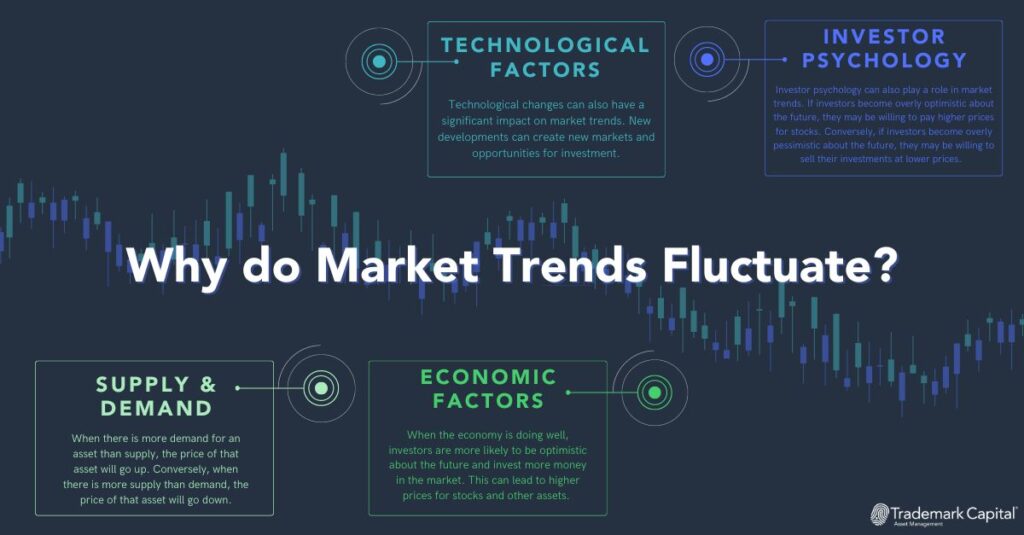The stock market is a marketplace where buyers and sellers of stocks (also called shares) meet to exchange ownership claims on businesses. Stocks represent a small piece of ownership in a company, and by buying stocks, investors can share in the company’s profits.
The stock market is a complex system, but it can be simplified into two main functions:
- To provide a way for companies to raise capital: When a company goes public, it sells shares of its stock to investors. This allows the company to raise money that it can use to grow its business.
- To provide a way for investors to make money: Investors buy stocks in the hope that the price of the stock will go up over time. When the price of a stock goes up, the investor can sell the stock for a profit.
The stock market is a volatile place, and the prices of stocks can go up and down quickly. As a result, market trends can fluctuate for a variety of reasons.
Some of the most common factors that affect market trends include:
- Supply and demand: The price of an asset is determined by supply and demand. When there is more demand for an asset than supply, the price of that asset will go up. Conversely, when there is more supply than demand, the price of that asset will go down.
- Economic factors: The overall state of the economy can have a significant impact on market trends. When the economy is doing well, investors are more likely to be optimistic about the future and invest more money in the market. This can lead to higher prices for stocks and other assets. Conversely, when the economy is doing poorly, investors are more likely to be pessimistic about the future and sell their investments. This can lead to lower prices for stocks and other assets.
- Technological factors: Technological changes can also have a significant impact on market trends. For example, the development of new technologies can create new markets and opportunities for investment. This can lead to higher prices for stocks and other assets in the affected industries. Conversely, the obsolescence of old technologies can lead to the decline of certain industries and lower prices for stocks and other assets in those industries.
- Investor psychology: Investor psychology can also play a role in market trends. For example, if investors become overly optimistic about the future, they may be willing to pay higher prices for stocks and other assets. This can lead to a bubble in the market, which can eventually burst and lead to lower prices. Conversely, if investors become overly pessimistic about the future, they may be willing to sell their investments at lower prices. This can lead to a bear market, which can eventually bottom out and lead to higher prices.

It is important to remember that market trends can fluctuate for a variety of reasons. There is no single factor that can always predict how the market will move. Trademark aims to provide Advisors and their clients with financial peace of mind, regardless of market performance by actively managing risk exposure and striving to deliver drawdown protection when investors need it most!
If you have any questions or comments, please send us an email or give us a call.
Sincerely,
The Trademark Capital® Team
This material is intended for informational purposes only and should not be construed as legal, accounting, tax, investment, or other professional advice. Trademark Capital’s investment strategies are built using quantitative, proprietary algorithms that are designed to identify and react to changing market conditions. However, investors should be aware that no investment strategy or risk management technique can guarantee returns or eliminate risk in any given market environment. As with all investments, Trademark Capital Management’s investment strategies are subject to risk and may lose money. The investment strategies presented are not appropriate for every investor and individual clients should review with their financial advisors the terms and conditions and risk involved with specific products or services. Due to our active risk management, our managed portfolios may underperform during bull markets. Past performance is no guarantee of future results.